Pakistan has been facing political instability since its inception, and the political crisis it is currently experiencing in the 21st century poses a serious threat to the integrity and security of the state. The current political chaos in the country began when former Prime Minister Imran Khan was ousted from power through a no-confidence motion in April 2022, which was initiated by the Pakistan Democratic Movement (PDM).
After being ousted from power, Khan claimed that there was a foreign conspiracy against his government. He also made allegations against the army, stating that they were involved in the conspiracy. In a public speech, he showed a piece of paper to the crowd and claimed that the letter was written to opposition leader Shehbaz Sharif from the USA, urging him to initiate a no-confidence motion against Khan in the National Assembly. However, the USA rejected these allegations, stating that such accusations go against political norms and could endanger bilateral relations between the two countries.
Khan believes that his ideology of change will eventually lead to a revolution. He finds the system at a dead end and considers himself the second Zulfiqar Ali Bhutto, who rose to power in the 1970s. He further claimed that Bhutto was sentenced to death due to foreign pressure and argued that the same conspiracy was being carried out against him, resulting in the end of his government. Allegations against the army have enraged the military, leading to action against him; in a rally, an unknown man fired a bullet at Khan, injuring his leg. Some analysts have warned that tensions between the military and former Prime Minister Khan could drive the country into a deep political crisis.
The current political crisis reveals a lack of good governance in the country, with the government’s poor decision-making processes creating crises for the people.
The current political crisis reveals a lack of good governance in the country. The government’s poor governance and slow decision-making processes create crises for the people. On the other hand, the opposition exacerbates the political crisis by protesting against the government, blocking roads, and calling for dharnas (sit-ins) to exert pressure on the government. These disruptions lead to the disruption of normal routines for institutions, businesses, and other sectors, causing significant losses.
In Pakistan, the Prime Minister’s chair is like a simple pendulum that oscillates among politicians, with each one wanting to sit on it and rule the country. Politicians engage in illegal activities to secure this position, and their actions have driven the country into a deep political crisis. Furthermore, military interventions in state politics have also contributed to the political crisis.
Former President of the USA, Abraham Lincoln, describes democracy as “the government of the people, by the people, and for the people.” But does Pakistan meet the definition of democracy?
Aqil Shah says in the book “Pakistan at the Crossroads” (chapter “The Military and Democracy”) that “General Kayani believed that military interventions are sometimes necessary to maintain Pakistan’s stability.” The military also exerts pressure on politicians to comply with the army’s will. In the same chapter of the same book, it is written that “One military intelligence official reportedly told an illegally detained Baluch politician, ‘Even if the president or chief justice tells us to release you, we won’t; we can torture you, or kill you, or keep you for years at our will. It is only the army chief and the intelligence chief that we obey.'”
The establishment’s monopoly over national security and defense policies has created problems for the state, and its interventions in state politics have contributed to the political crisis.
These factors indicate that Pakistan’s political system does not align with democratic principles. Additionally, the creation of the PML-Q by the military and ISI as a new right-wing political party has further influenced politics indirectly. The military’s monopoly over national security and defense policies has also created problems for the state.
For instance, the Soviet war in Afghanistan, which lasted from 1979 to 1989, was a military conflict between the Soviet Union and the Afghan Mujahideen resistance fighters. The Soviet Union invaded Afghanistan in December 1979 to support the communist government in Kabul. At that time, Zia ul Haq was recruiting Pakistani youth for jihad in Afghanistan to fight against Russia.
The involvement of Pakistan in the war had significant political implications. It deepened the existing divisions within Pakistani society, with some factions supporting the government’s decision to aid the Mujahideen, while others opposed it. It intensified the polarization between Islamist and secular forces within Pakistan. It contributed to the eventual Soviet withdrawal from Afghanistan in 1989 but also fueled the rise of militant Islamist groups, including the Taliban, which later became a headache for Pakistan.
Pakistan’s political system does not align with democratic principles, and the military’s influence over politics has further undermined democracy.
Leon Brown says, “History repeats itself endlessly for those who are unwilling to learn from the past.” This profound statement emphasizes the significance of studying and understanding historical events to avoid repeating the same mistakes. But we haven’t learned anything from joining the Soviet war in Afghanistan and its implications for our country.
In 2001, Pakistan’s decision to become an ally of the United States in the “war against terrorism” was made by a general. This decision has led to internal strife and security threats, as seen today in the form of the Taliban and other anti-state actors. The Taliban has also interfered in state politics, threatening and attacking secular and religious parties such as the ANP, PPP, and MQM during the 2013 elections. Moreover, the Taliban has exerted influence over certain areas of Karachi.
In conclusion, it is crucial for every state institution to operate within its designated domain. The military must refrain from interfering in politics, as this can lead to severe and fearful internal strife. Political parties should prioritize addressing Pakistan’s problems and work in the best interests of the state, rather than their own interests. Moreover, learning from history is essential, as failing to do so will result in history repeating itself in its worst form. History plays a vital role in shaping the political landscape of any country, and the current crisis can be seen as a culmination of historical events, decisions, and policies that have unfolded over time.
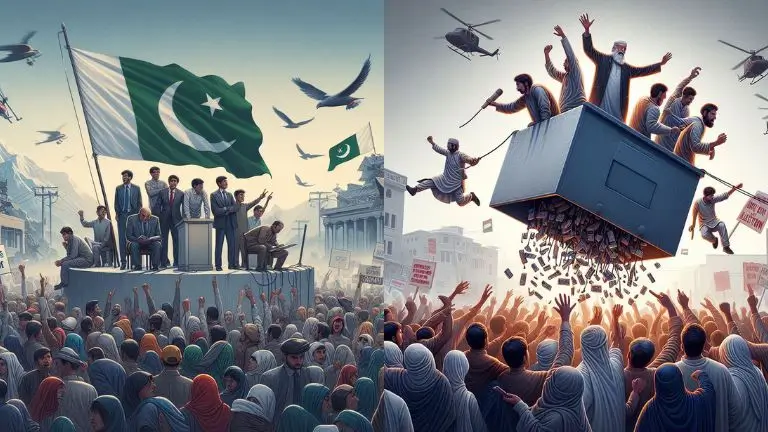





stunning, keep it up 👏
❤️
❤️❤️❤️
A very detailed analysis. Sums up many things.
❤️
❤️❤️❤️